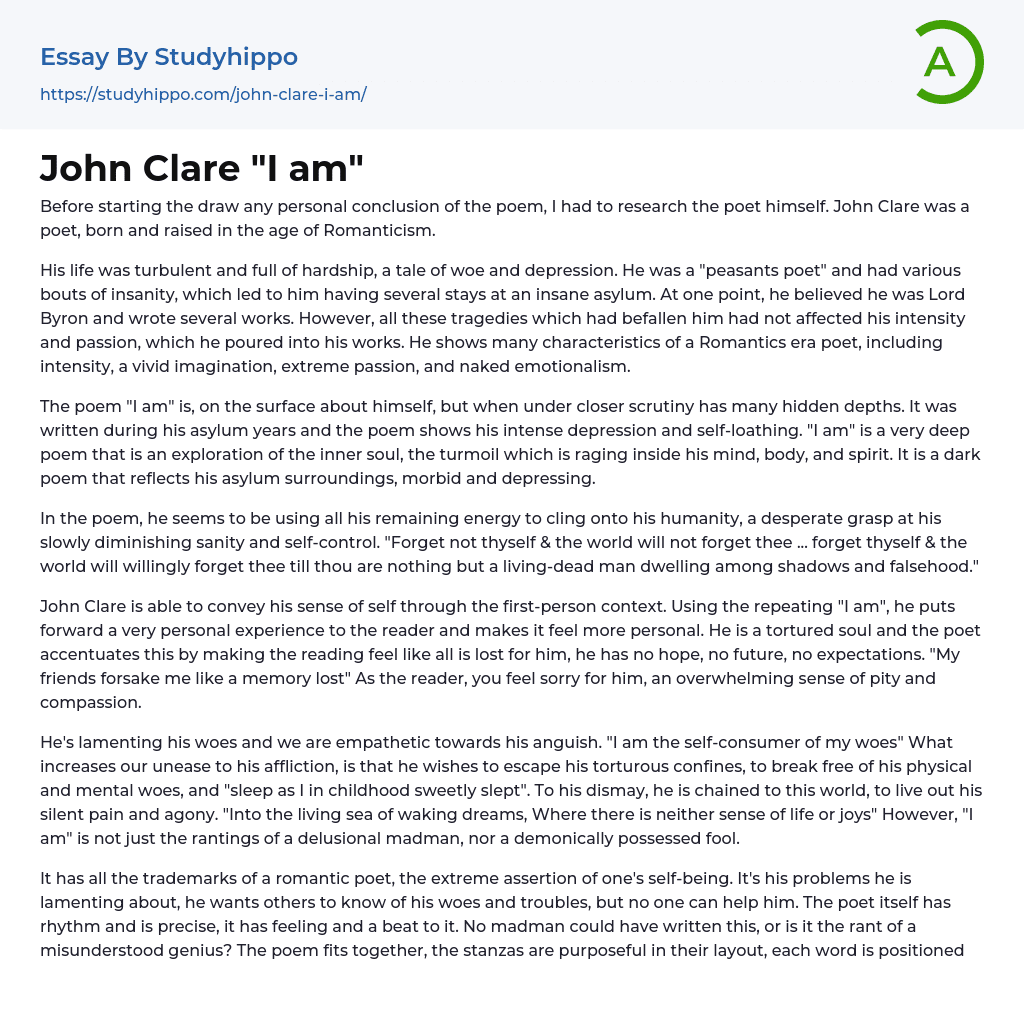Before starting the draw any personal conclusion of the poem, I had to research the poet himself. John Clare was a poet, born and raised in the age of Romanticism.
His life was turbulent and full of hardship, a tale of woe and depression. He was a "peasants poet" and had various bouts of insanity, which led to him having several stays at an insane asylum. At one point, he believed he was Lord Byron and wrote several works. However, all these tragedies which had befallen him had not affected his intensity and passion, which he poured into his works. He shows many characteristics of a Romantics era poet, including intensity, a vivid imagination, extreme passion, and naked emotionalism.
The poem "I am" is, on the surface about himself, but when under closer scrutiny has many hidden depths. It was writ
...ten during his asylum years and the poem shows his intense depression and self-loathing. "I am" is a very deep poem that is an exploration of the inner soul, the turmoil which is raging inside his mind, body, and spirit. It is a dark poem that reflects his asylum surroundings, morbid and depressing.
In the poem, he seems to be using all his remaining energy to cling onto his humanity, a desperate grasp at his slowly diminishing sanity and self-control. "Forget not thyself & the world will not forget thee ... forget thyself & the world will willingly forget thee till thou are nothing but a living-dead man dwelling among shadows and falsehood."
John Clare is able to convey his sense of self through the first-person context. Using the repeating "I am", he puts forward a very personal experienc
to the reader and makes it feel more personal. He is a tortured soul and the poet accentuates this by making the reading feel like all is lost for him, he has no hope, no future, no expectations. "My friends forsake me like a memory lost" As the reader, you feel sorry for him, an overwhelming sense of pity and compassion.
He's lamenting his woes and we are empathetic towards his anguish. "I am the self-consumer of my woes" What increases our unease to his affliction, is that he wishes to escape his torturous confines, to break free of his physical and mental woes, and "sleep as I in childhood sweetly slept". To his dismay, he is chained to this world, to live out his silent pain and agony. "Into the living sea of waking dreams, Where there is neither sense of life or joys" However, "I am" is not just the rantings of a delusional madman, nor a demonically possessed fool.
It has all the trademarks of a romantic poet, the extreme assertion of one's self-being. It's his problems he is lamenting about, he wants others to know of his woes and troubles, but no one can help him. The poet itself has rhythm and is precise, it has feeling and a beat to it. No madman could have written this, or is it the rant of a misunderstood genius? The poem fits together, the stanzas are purposeful in their layout, each word is positioned to be enunciated correctly in which it fits with the next line.
John Clare may have been psychologically unfit to participate with society, but within that madness of his brain, was a
genius ticking away. Perhaps sub-consciously as he wrote the poem, he positioned the words as such, but alas, we shall never know. The last stanza is about lost innocence, a connection to lost/remembered childhood, a key theme of the Romantic period. It is also a redemption prayer for past wrongs, and a cry out for peace beyond our understanding. And yet, it is all this and so much more.
In the final line, John Clare shows his final connection to inner peace and nature."The grass below - above the vaulted sky" The enclosing walls of the asylum are nowhere to be seen, only open space and where John Clare wishes truly in his heart to find the peace and serenity he is so deeply missing. I believe that people can connect to this poem, as it deals with the issue of depression. It is a widely known problem with many people and what John Clare describes is exactly the kind of pain someone who is depressed could experience. He is dealing with things people can relate to, nothing out of the ordinary or far-fetched.
His words are one of mad suffering and we have all been through something like that (even if it is small) at least once in our lives when the world seems like it has turned its back on you, and there is nothing left in your life but sorrow and pain.
- Allegory essays
- Alliteration essays
- Comedy essays
- Comic book essays
- Drama essays
- Dystopia essays
- Fairy Tale essays
- Fantasy essays
- Fiction essays
- Ghost essays
- Gothic Fiction essays
- Gothic Literature essays
- Irony essays
- Legend essays
- Memoir essays
- Novel essays
- Poetry essays
- Satire essays
- Science Fiction essays
- Short Story essays
- The western essays
- Tragedy essays
- Witchcraft essays
- Cuban Missile Crisis essays
- Fidel Castro essays
- French Revolution essays
- Han Dynasty essays
- Hiroshima essays
- Imperialism essays
- Jack The Ripper essays
- Mao Zedong essays
- Middle Ages essays
- Mongols essays
- Nelson Mandela essays
- Ottoman Empire essays
- Reformation essays
- Reign of Terror essays
- Renaissance essays
- Roaring Twenties essays
- Romanticism essays
- Samurai essays
- Scientific Revolution essays
- Soviet Union essays
- Afterlife essays
- Atheism essays
- Bible essays
- Buddhism essays
- Christian Worldview essays
- Christianity essays
- Confession essays




